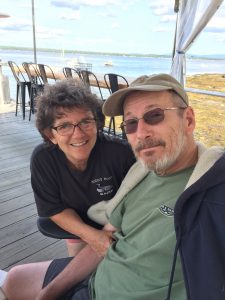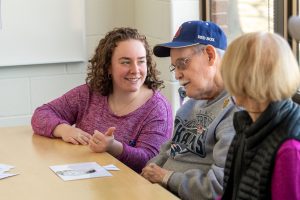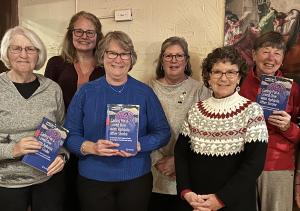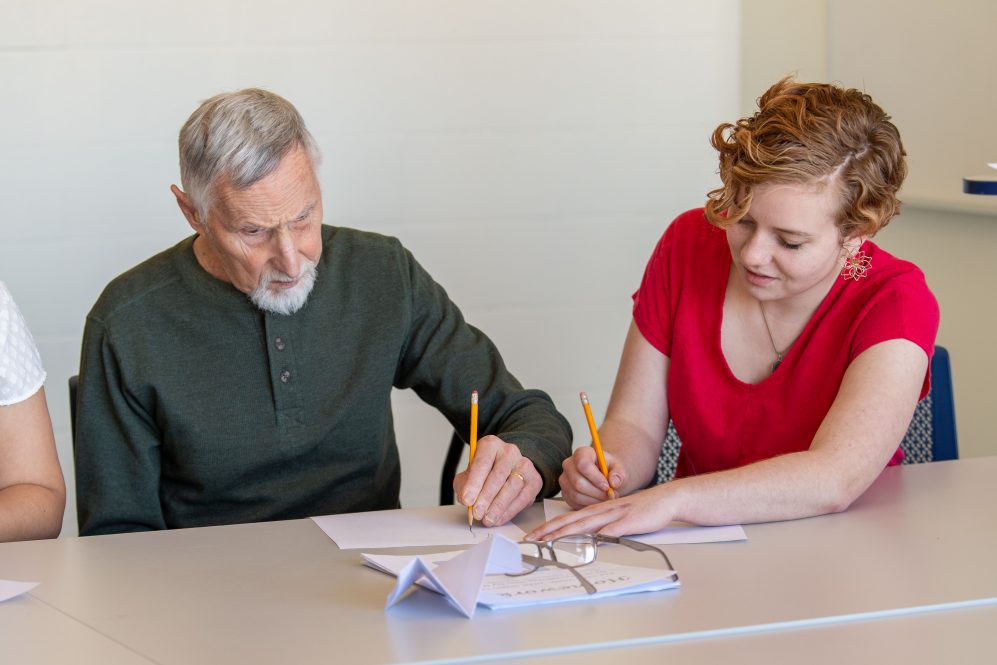Until about five years ago, Jennifer Mozeiko’s research primarily focused on the question of dosage: How much speech language therapy would a person with aphasia need to get better, or at least get to a functional new normal?
“I wasn’t focused on the family. My attention was on the person with aphasia, since that’s what I’m trained for,” says Mozeiko, an associate professor in the speech, language, and hearing sciences department in the College of Liberal Arts and Sciences and director of UConn’s Aphasia Rehab Lab.
Then she noticed the caregivers who waited 90 minutes once a week while their loved ones participated in one of UConn’s six aphasia language support groups. Most of them were women thrown into the job of full-time caregiver for mostly husbands who’d suffered a stroke and now were struggling to communicate.
“They would ask me, ‘Can we have a caregiver group,’ and I kept telling them I’m not trained for that,” Mozeiko says. “I didn’t grasp at the time just how essential caregiver education and the caregiver themselves are to the rehabilitative process. But, of course, it’s not just the person who had the stroke, it’s the entire family who is in crisis mode, and it’s critical that they have a place to vent, swap stories, and strategize because the medical system provides so few answers. Caregivers need to learn from each other.”
Much the same as a caregiver of someone with any life-changing diagnosis – like Alzheimer’s, cancer, or mental health issues – the better equipped an aphasia caregiver is, the better the quality of life for everyone involved, Mozeiko says, and the better the chance for some level of recovery.
But such holistic treatment isn’t commonplace.
“I’ve heard from recent graduates that working with the caregiver to help maximize outcomes was not part of their aphasia classes. It’s not even systematized in research. Our field is relatively new – compared to psychology, for example – and there’s so much to do, that researchers tend to prioritize treatment variables or mechanism of recovery versus what’s happening at home and how we might facilitate better recoveries that way,” she says.
Then Mozeiko noticed the caregivers in the waiting room.
The trajectory of her research changed. She started to realize that if caregivers and family members felt supported, those in their care would be as well. In 2018, she carved out 90 minutes once a month – concurrent to one of the language support groups – solely for caregivers.
And now, those caregivers have endeavored to spread their reach.
‘You’re in shock and there is no guidance whatsoever’
Deborah Yost woke one morning in August 2018 to find that her husband Byron, an attorney in solo practice in Pennsylvania, had a stroke at some point overnight, leaving him unable to walk and talk – except for the word “right,” which he used to answer whatever question asked of him.

Suddenly, Yost was in the position of medical decisionmaker and head of the household, while mourning the loss of her best friend, or at least the conversations and verbal connection the two once shared.
“When your loved one has a stroke, you don’t know what to do. You’re in shock, you’re dealing with medical personnel and they’re telling you all these things about your loved one and there’s no guide, no directory that tells you to look into this or that,” she says. “There is no guidance whatsoever.”
Books about the physical aspects of a stroke – what happens in the brain during and after a stroke, the potential effects, and prognosis – only give caregivers some of the information they need, Yost says.
There’s so much more that goes into caring for someone with aphasia, well beyond the already daunting task of figuring out a way for them to convey basic needs, never mind coping with whatever physical limitations they might be left with.
In Yost’s case, because Byron would say only “right,” she had to deduce log-in information for their personal financial accounts and bills – things he’d been responsible for and things that needed attention. She moved them to Connecticut to be closer to family, selling their dream home in Pennsylvania and moving into a one-floor abode to accommodate his ongoing mobility issues.
She also had to close out his law practice that included many active clients still wanting his advice and courthouses expecting his attendance for cases. Yost built a career in special education- she has a master’s degree from UConn in 1982 and a Ph.D. in 1996 – and relied on the help of other attorneys to manage.
“I’d visit him every day in the hospital and in rehab, and I watched the therapies they were using with him. The last four days before he was to be discharged, they gave me some training – how to help him in the bathroom and maneuver a wheelchair,” Yost says, noting the difficulty of moving a 6-foot-tall man when one is only 5 feet tall.
But, she continues, “you’re all by yourself. Everybody is there caring for my husband, which is appropriate, but there was nobody saying to me, ‘Let me help you make some of these decisions you have to make,’ like which rehab hospital to go to, which support services he might need.”
Once in Connecticut, she found UConn’s aphasia group, connected Byron with language services there, and met Mozeiko and the caregivers in the waiting room.
“When we were meeting in our support group, it was like, ‘Thank God, someone understands what we are going through.’ The only people who can really understand are the people who are going through it,” she says.
Aphasia: Getting the Brain to Rewire is Key to Some Level of Recovery
Aphasia is a common outcome from a stroke, with a third of people ending up with the communicative disorder that varies by person in degree and expression.
Mozeiko says some people seem unaware they’re speaking unintelligibly, while others know they have only a few words and phrases at their disposal. Still others appear to speak normally, although their sentences might be shorter and their cadence slower.
Some symptoms can abate once swelling from the stroke goes down, but neural death and damage cause lasting effects for life, if only subtly after intense therapy, she adds. That doesn’t mean, however, that quality of life is forever degraded.

Mozeiko’s previous research looked at intensive therapies – three hours a day of intervention, every day for two weeks – and noted significant gains among patients: “It’s not like they’re fixed. You wouldn’t say, ‘Wow, he’s all better.’ We had one client who could not keep track of a conversation. His family felt like he never had any idea what was going on. After treatment, they remarked that he seemed to be plugged in. His verbal language wasn’t much better, but he was enjoying being part of his family and his church again.”
Yost loves the word neuroplasticity because it refers to the way the brain can rewire itself with the right interventions and work. Four years after his stroke, Byron still gets speech and language services – a remarkable amount of time because some people get as few as six weeks and others even less.
A neurologist once said Byron would never walk or talk again. Yet, Yost tells the story that recently he indicated he wanted to stay up late one night and in telling her so started the sentence “I want to…”
She told him he needed a verb and asked if it had something to do with TV. He said it did.
“What verb goes along with TV,” she says she asked. “It took him awhile but then he said, ‘I want to watch TV.’ That was a big win.”
And that is four years after the stroke left him with the ability to use only the word “right.”
“Just as disappointing are doctors who say the opposite and tell patients, ‘You’ll be fine in a year,’” Mozeiko says. “I had someone come to me a year after her stroke to ask what was going on. The doctor had told her she would be fine in a year. That’s just unrealistic. Everybody is different. Some people make unbelievable gains despite huge lesions in their left hemisphere and some with small, discrete lesions make very slow progress and don’t make the recoveries you might expect.”
Mozeiko and her graduate students in the aphasia lab tend to work with those who have stroke-induced aphasia. That’s different than primary progressive aphasia, she explains, which falls into the same category as dementia because those with it tend to continually decline.
Stroke-induced aphasia can be described simply as a loss of communicative abilities, whereas primary progressive aphasia might start with aphasia-like symptoms but often goes on to affect cognition, like Alzheimer’s disease.
One stroke-induced patient, a 23-year-old who’d just gotten his dream job as a police officer when he had a cerebral hemorrhage, had a grim prognosis, Mozeiko says. But he’s made so much progress over the two decades he’s been in therapy that he now volunteers, socializes, and drives with adaptive technology.
“Aphasia is a lifetime diagnosis, but it can get much better,” Mozeiko says. “One of the big misconceptions out there is that after three months or a year, you can’t make any more progress. There are still neurologists telling their patients that and that leaves people with the fear they’re going to be like this for the rest of their lives.
“They can continue to make quite a bit of progress for many years,” she continues. “But everybody’s different in how they get there and how quickly they improve. Those who do best tend to be the most motivated. They need to want it. They also often have a family support system behind them.”
That’s where support groups come in.
Yost says Byron loves to go to his aphasia group and comes out laughing and happy. For her, the caregiver group, which now meets weekly, is just as beneficial.
“If it wasn’t for these aphasia groups and the little tips you learn along the way about how to help your spouse or loved one at home with aphasia, I don’t know if I’d be doing these little tricks. I don’t think I would know enough to do them,” she says.
“It’s so valuable for people with aphasia to come in and see lots of other people with aphasia,” Mozeiko adds. “Most never heard the word until they were diagnosed, so I think that’s the No. 1 thing. They’ve lost the ability to communicate but not to think intelligently. These are people who had amazing jobs and, because language is how our intelligence is judged, suddenly they’re being perceived differently, maybe as dumb. That’s a horrible feeling. To come into a room and see people with varying degrees of severity is really affirming.”
Personal Stories Become Book Project
The caregiver support group has given those in the waiting room a place to drop the façade that many feel needs to go up to be supportive and on pointe around their loved one.
There, they can breathe, inadvertently – or sometimes outright – giving each other advice on how to handle situations or other ways to cope. Yost, as a retired college professor used to taking command of a group, has taken on the role of its leader.
“We were all sitting around in March 2020, I remember it so well, Jen was cleaning off the tables because COVID had just started and we weren’t sure what this pandemic was at the time,” Yost says. “We were just chatting as we usually do about everything – what we’re doing with our loved ones, problems we’re having. Then one of the women said, ‘We really should write a book,’ and all of us said, ‘Yes, we could write a book because there is so much to say.’”
Mozeiko says she contacted a few others who over the years had made the same comment to her and they agreed to participate, suddenly building a roster of seven women who were willing to write essays about their experiences.

“Caring For a Loved One with Aphasia After Stroke” (Springer) became their pandemic project.
“Most of the women who contributed had never written anything professionally before writing these beautiful stories about their loved ones,” says Mozeiko, who together with Yost served as the book’s editors. “We really worked to keep the editing to a minimum to preserve their own voices, their own personalities.”
Chapters tell stories of devotion, fortitude, love, adjustment, stress, hope, sacrifice, and partnership.
“Our caregivers said they were looking for this kind of book and there wasn’t one out there, until now,” Mozeiko says. “The hope is somebody will read this and maybe they don’t identify with one essayist, but maybe they identify with the next one.”
Some of the tips shared might be as simple as playing the radio to fill the silence of a long quiet car ride without conversation. Others are more creative, like teaching the concept of small, medium, and large by using pieces of old wooden pallets and fitting them together like a puzzle – do you need a small, medium, or large piece to fill this space.
“If I had a book like this when Byron had his stroke, I would have really felt like I could manage because other people have,” Yost says. “Our whole purpose in writing this was to provide our stories to people in the same position we were in and remind speech-language pathologists or other professionals of the importance of the caregiver’s state of mind, because nobody really asks the caregiver, ‘How are you doing today?’ It’s all about the patient and we really felt that we needed to share our stories for those people.”
All proceeds from the sale of “Caring For a Loved One with Aphasia After Stroke” are given to UConn’s Aphasia Language-Support Program via the UConn Foundation. Several of the essayists participated in a panel talk before the 2022 American Speech-Language-Hearing Association conference, sharing their stories and impressing on professionals the importance of supporting both the patient and the caregiver.



